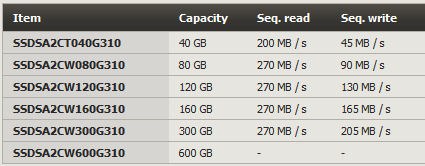Intel Announces Third-Generation SSD: Intel® Solid-State Drive 320 Ser
- Third-generation Intel® SSD 320 Series on 25-nm NAND flash memory offers 40-, 80-, 120-, 160-GB plus higher capacity 300- and 600GB options.
- Advanced architecture enables robust, reliable SSDs with enhanced security features for desktop/notebook PCs or server data center storage.
- Performance, reliability upgrades enhance solid line of high-performing SSDs with up to $100 price drop over current Intel® X25-M SSD model.
Intel Announces Third-Generation SSD: Intel® Solid-State Drive 320 Ser
Last Updated: 29 Mar 2011 at 10:59
Features Enhanced Performance/Reliability, Larger Capacities and 25nm Intel® NAND Flash Memory
NEWS HIGHLIGHTS
SANTA CLARA, Calif., March 28, 2011 – Intel Corporation announced today its highly anticipated third-generation solid-state drive (SSD) the Intel® Solid-State Drive 320 Series (Intel® SSD 320 Series). Based on its industry-leading 25-nanometer (nm) NAND flash memory, the Intel SSD 320 replaces and builds on its high-performing Intel® X25-M SATA SSD. Delivering more performance and uniquely architected reliability features, the new Intel SSD 320 offers new higher capacity models, while taking advantage of cost benefits from its#25nm process with an up to 30 percent price reduction over its current generation.
"Intel designed new quality and reliability features into our SSDs to take advantage of the latest 25nm silicon, so we could deliver cost advantages to our customers," said Pete Hazen, director of marketing for the Intel Non-Volatile Memory (NVM) Solutions Group. "Intel's third generation of SSDs adds enhanced data security features, power-loss management and innovative data redundancy features to once again advance SSD technology. Whether it's a consumer or corporate IT looking to upgrade from a hard disk drive, or an enterprise seeking to deploy SSDs in their data centers, the new Intel SSD 320 Series will continue to build on our reputation of high quality and dependability over the life of the SSD."
The Intel SSD 320 is the next generation of Intel's client product line for use on desktop and notebook PCs. It is targeted for mainstream consumers, corporate IT or PC enthusiasts who would like a substantial performance boost over conventional mechanical hard disk drives (HDDs). An SSD is more rugged, uses less power and reduces the HDD bottleneck to speed PC processes such as boot up and the opening of files and favorite applications. In fact, an upgrade from an HDD to an Intel SSD can give users one of the single-best performance boosts, providing an up to 66 percent gain in overall system responsiveness.1
The Intel SSD 320 Series comes in 40 gigabyte (GB), 80GB, 120GB, 160GB and new higher capacity 300GB and 600GB versions. It uses the 3 gigabit-per-second (3gbps) SATA II interface to support an SSD upgrade for the more than 1 billion SATA II PCs installed throughout the world. Continuing to offer high-performing random read and write speeds, which most affect a user's daily computing experience, the Intel SSD 320 produces up to 39,500 input/output operations per second (IOPS) random reads and 23,000 IOPS random writes on its highest-capacity drives. In addition, the company has more than doubled sequential write speeds from its second generation to 220 megabytes-per-second (MB/s) sequential writes and still maintains one of the highest read throughputs at up to 270 MB/s sequential reads. This greatly improves a user's multitasking capabilities. For example, a user can easily play background music or download a video, while working on a document with no perceivable slow down.
Some info and links on the Intel 320 SSD in this thread, specs and prices.
Intel X25-M 120GB SSD - Deactivated on Newegg
The reviews are being posted.
The Intel SSD 320 Review: 25nm G3 is Finally Here
Related Discussions


